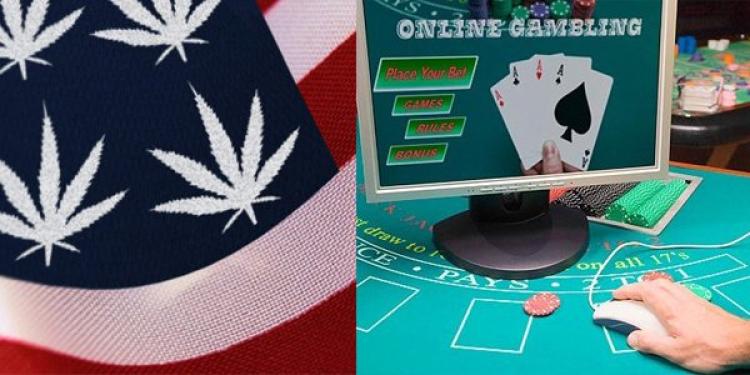Why Americans Prefer Marijuana to Online Gambling but Politicians Don’t Care
Posted: May 9, 2014
Updated: October 4, 2017

While more Americans support legalization of marijuana over that of online gambling, politicians in most states are putting a higher priority on online casinos.
The US is full of contradictions. While citizens often boast about a liberal lifestyle heavy on personal freedom and individuality, America is also known as a bastion of puritanism. In some ways things are generally open, but public morality norms have led to prohibition of everything from alcohol to sex, gambling and recreational drugs.
• A study by Fairleigh Dickinson University found that 50 percent of Americans support legalizing marijuana, while only 27 percent favor online gambling
• While New Jersey residents are more likely to support marijuana than online gambling, governor Chris Christie signed an online casino bill but refuses to do the same for recreational marijuana
• Three states have online gambling while only two have legal marijuana
Both marijuana use and online casinos in the US are banned under federal law, but the Obama administration has assured states that it won’t interfere with their ability to create legal markets for either activity. Since 2012 Delaware, New Jersey and Nevada have passed some form of online gambling and Colorado and Washington have legalized marijuana for recreational use.
In America’s system of representative democracy legislation doesn’t always closely follow public opinion. A recent study by Fairleigh Dickinson University found that 50 percent of Americans favor legalizing marijuana for recreational use while only 27 percent think that online casinos should be legal. Despite these numbers, more states have legal online gambling than legal marijuana.
Why are Americans more inclined toward marijuana?
The short answer is that the marijuana debate gets heavier media coverage. The same study from Fairleigh Dickinson found that 86 percent of Americans reported having read about marijuana legalization in the media, compared to only 35 percent for online gambling.
Marijuana has been central to the public discourse for quite some time. And given the fact that 20 states already have medicinal marijuana and tens of millions of Americans use the substance anyway, people are starting to think that government prohibition is pointless.
By contrast, federal American gambling laws have only allowed online casinos since 2011, and only three states have created markets, with ten more potentially following. The debate has only been in the public mind for roughly a decade, when the Bush administration tried to prevent foreign sites from serving American gamblers.
Many Americans sincerely believe that gambling is more destructive than marijuana use. But more importantly, the public has been prepared for marijuana legalization. Most people are comfortable with it, even if they don’t support it outright. By contrast, online casinos are brand new and frightening to many people.
The case of New Jersey
Even in New Jersey, the poster boy for online gambling, the majority of citizens think that the activity should be illegal. The online casino bill passed because the state needed a new source of tax revenue, not because the rank-and-file voter supported the measure. In fact, it got relatively little attention outside of gambling news.
By contrast, a 2012 poll found that 48 percent of New Jerseyites favored legalizing recreational marijuana, compared to 47 percent who opposed. In 2012 state senator Nicholas Scutari proposed legislation that would have made the growth, sale and consumption of marijuana legally licensed.
Chris Christie, the same governor who went against public opinion to sign a bill to create an online casino market, made it clear that he would never sign a recreational marijuana bill:
“Let me be clear on this: I’m not, as long as I’m governor, going to permit the decriminalization or recreational use of marijuana… it sends the wrong message to children… If you want someone who will, you’re going to have to elect a different governor.”
Christie will be running for president in 2016 and he needs to win over rural and southern social conservatives if he is going to have a chance at the Republican nomination. But his seeming disregard for public opinion on these issues is shared by countless American governors and legislators.
Why public officials are going against the wishes of voters
Both marijuana and online gambling have serious fiscal implications. State governments can raise large amounts of money by regulating and taxing either activity. States are also scrambling to plug holes in public budgets during the weak recovery from recession.
But online gambling is phrased by politicians as a technocratic fix for budget problems, while marijuana legalization is still treated as a significant social movement. Gambling is already legal, especially in New Jersey, so expanding it doesn’t fundamentally change things. But legalizing marijuana is unprecedented and irreversible (or so politicians think).
In addition, due to the influence of national political parties on state officials, Republicans like Chris Christies of New Jersey and Joe Barton of Texas can support online gambling without facing a backlash from their sponsors, while backing marijuana would be politically suicidal. You can be a social conservative and support online casinos or poker sites. You can’t be a social conservative and support legal marijuana.
This represents another strange paradox in America’s contradictory society and political system. While more Americans support legal marijuana than online gambling, online gambling is an easier political sell. Go figure.












